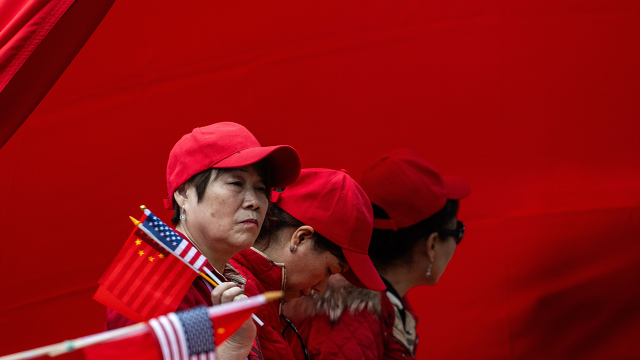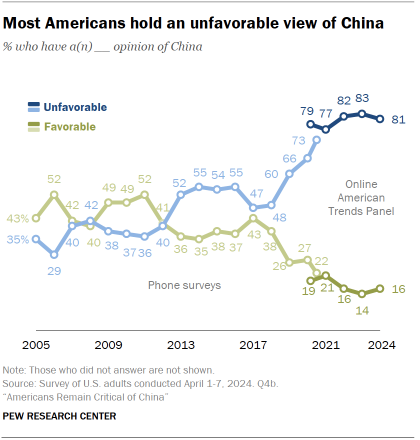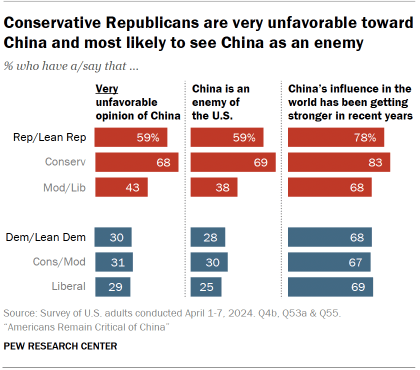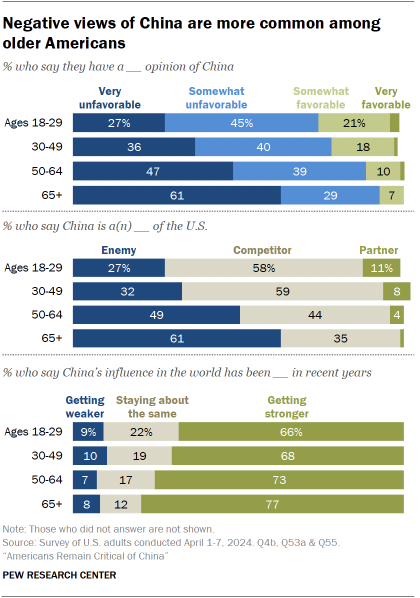Many see China as increasingly influential and consider limiting its power a top priority

Pew Research Center conducted this study to understand Americans’ opinions of China, its role in the world and its impact on the U.S. economy. For this analysis, we surveyed 3,600 U.S. adults from April 1 to April 7, 2024. Everyone who took part in this survey is a member of the Center’s American Trends Panel (ATP), an online survey panel that is recruited through national, random sampling of residential addresses. This way nearly all U.S. adults have a chance of selection. The survey is weighted to be representative of the U.S. adult population by gender, race, ethnicity, partisan affiliation, education and other categories. Read more about the ATP’s methodology.
Here are the questions used for this analysis, along with responses, and its methodology.

For the fifth year in a row, about eight-in-ten Americans report an unfavorable view of China, according to a new Pew Research Center survey. Today, 81% of U.S. adults see the country unfavorably, including 43% who hold a very unfavorable opinion. Chinese President Xi Jinping receives similarly negative ratings.
Still, many Americans agree that China’s influence in the world has been getting stronger in recent years (71%). This sense is accompanied by concern about how China interacts with other nations: 61% of Americans are at least somewhat concerned about China’s territorial disputes with neighboring countries. (For more U.S. views of China’s role in the world, go to Chapter 1.)
When it comes to China’s relationship with the United States, few see China as a partner (6%) and most Americans instead label it a competitor (50%) or an enemy (42%) of the U.S. They are likewise critical of China’s impact on the U.S. economy, describing its influence as large and negative. Roughly half of Americans think limiting China’s power and influence should be a top U.S. foreign policy priority, and another 42% think this should be given some priority. (For more assessments of China’s relationship with the U.S., go to Chapter 2.)

According to the Center survey, which was conducted April 1-7, 2024, among 3,600 U.S. adults, Republicans are more wary of China than Democrats are.
Republicans and Republican-leaning independents are about twice as likely as Democrats and Democratic leaners to hold a very unfavorable view of China and to consider China an enemy of the U.S. They are also more likely to say that China has recently become more influential.
Republicans also have wider ideological differences within their party, and conservative Republicans stand out on many measures:
- Conservative Republicans are 25 percentage points more likely than moderate and liberal Republicans to express a very unfavorable view of China (68% vs. 43%). There is no difference between liberal Democrats and moderate and conservative Democrats on this question.
- Conservative Republicans are also 31 points more likely than moderate and liberal Republicans to see China as an enemy of the U.S. No ideological difference is present among Democrats.
- While 83% of conservative Republicans say China’s influence in the world has been getting stronger in recent years, 68% of moderate and liberal Republicans say the same. The latter is similar to the shares of moderate and conservative Democrats (67%) and liberal Democrats (69%) who hold this view.

Older Americans are generally more critical of China. A 61% majority of adults ages 65 and older have a very unfavorable view of China, compared with 27% of adults under 30. Adults ages 65 and older are also more than twice as likely as those ages 18 to 29 to see China as an enemy of the U.S. For their part, younger adults are more likely than older ones to label China as a competitor and as a partner.
Older Americans also perceive more growth in China’s international influence. Roughly three-quarters of adults ages 65 and older say China’s influence has been getting stronger in recent years, while about two-thirds of adults under 30 say the same.
Americans with a sour view of the U.S. economy have more critical opinions of China. Those who say the current U.S. economic situation is bad are more likely to hold an unfavorable opinion of China and to say China has a great deal or fair amount of negative influence on the U.S. economy. They are also more likely to see China as an enemy when compared with those who see the economy positively.




